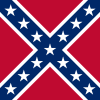Southern History Series: Country Ideology In Colonial South Carolina

Editor’s Note: This is a work in progress.
South Carolina was the cultural hearth of the Deep South.
In order to understand the culture of the Deep South, it makes sense to start in the Lowcountry and track the spread of this culture into Georgia and North Carolina and south and west into Florida, Alabama, Mississippi, Louisiana, West Tennessee, Arkansas and East Texas.
John Locke has a very interesting relationship with South Carolina. Locke’s patron Anthony Ashley-Cooper, the Earl of Shaftesbury, was one of the Lords Proprietors of Carolina. He envisioned the colony as his own private utopia and had Locke draft the Fundamental Constitutions of Carolina.
If any American colony could be said to be an experiment in Lockean classical liberalism, then it has to be South Carolina because Locke himself was personally involved in the founding of the colony. And yet, the Fundamental Constitutions of Carolina was never adopted in the colony. The colonists resisted the Lords Proprietors and eventually they overthrew the government and South Carolina became a royal colony in 1719.
The following excerpt on the triumph of “country ideology” in mid-18th century South Carolina comes from Robert M. Weir’s book Colonial South Carolina: A History:
“The existential character of the contest also partly accounts for the influence of later British writings. Their roots, too, were in the seventeenth century, and specifically in the 1670s and early 1680s when a series of political crises prompted Shaftesbury – or his associates – to modernize many of Harrington’s concepts. In this form, these ideas were picked up, fused with others, amplified, and popularized by the political opposition during Walpole’s ministry. The resulting “country ideology” – which embodied a profound mistrust of power, and especially of the executive’s putative ability to expand its power by corrupt means – quickly spread throughout the empire. Yet its presence in South Carolina in some ways anomalous, for many of its main themes do not appear at first glance to have been very relevant to local politics. …
Partly because this process was self-reinforcing, and partly because remoteness from the center of real power tended to make colonials fearful of unpleasant surprises, Carolinians found this literature fascinating and persuasive. Indeed, it had a certain plausibility when considered only in the local context. Did the crown not appoint the council? And did it not usually support the prerogative? In addition, to be familiar with this ideology was to be au courant, and to act on its precepts was to behave like some authoritative figures in England argued that patriotic Englishmen should behave. Among these figures were a number of writers, like Bolingbroke and the most popular poet in the eighteenth century, Alexander Pope, who professed to see the salvation of the nation in the virtue of the gentry. Such a notion was obviously congenial to men who were already attempting to pattern themselves on the English country gentlemen in other areas of life. Writings like the Freeholder’s Political Catechism by Bolingbroke and Cato’s Letters by two skillful popularizers – John Trenchard and Thomas Gordon – whose essays dealt with “Publick Spirit,” “the encroaching Nature of Power, [which was] ever to be watched and checked,” and “the important Duty of Attendance in Parliament” – thus became textbooks of appropriate political behavior. One can therefore almost say that if the parliamentary journals and manuals of the seventeenth century provided guidelines for the collective conduct of the Commons as an institution, the opposition writers of the eighteenth century provided guidance for the political behavior of its members as individuals.
By midcentury politically conscious South Carolinians shared a coherent body of ideals, assumptions, and beliefs concerning politics which embodied the central tenants of country ideology. The foundation of all their political assumptions was their conception of human nature, which they deeply distrusted …”
Source: http://www.occidentaldissent.com/2019/06/10/southern-history-series-country-ideology-in-colonial-south-carolina/
Anyone can join.
Anyone can contribute.
Anyone can become informed about their world.
"United We Stand" Click Here To Create Your Personal Citizen Journalist Account Today, Be Sure To Invite Your Friends.
Please Help Support BeforeitsNews by trying our Natural Health Products below!
Order by Phone at 888-809-8385 or online at https://mitocopper.com M - F 9am to 5pm EST
Order by Phone at 866-388-7003 or online at https://www.herbanomic.com M - F 9am to 5pm EST
Order by Phone at 866-388-7003 or online at https://www.herbanomics.com M - F 9am to 5pm EST
Humic & Fulvic Trace Minerals Complex - Nature's most important supplement! Vivid Dreams again!
HNEX HydroNano EXtracellular Water - Improve immune system health and reduce inflammation.
Ultimate Clinical Potency Curcumin - Natural pain relief, reduce inflammation and so much more.
MitoCopper - Bioavailable Copper destroys pathogens and gives you more energy. (See Blood Video)
Oxy Powder - Natural Colon Cleanser! Cleans out toxic buildup with oxygen!
Nascent Iodine - Promotes detoxification, mental focus and thyroid health.
Smart Meter Cover - Reduces Smart Meter radiation by 96%! (See Video).





